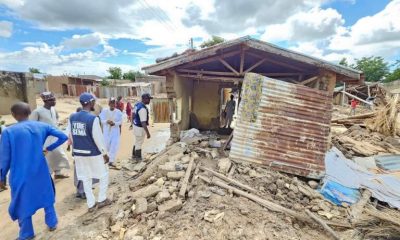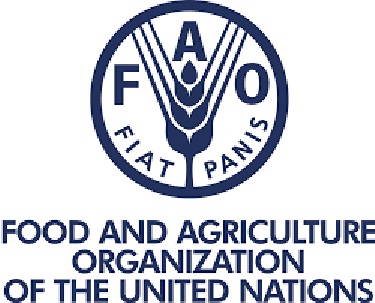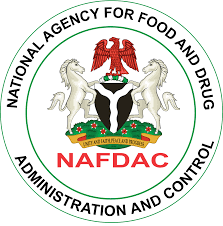NEWS
Urbanisation: Experts Proffer Solutions to Emerging Challenges in Africa
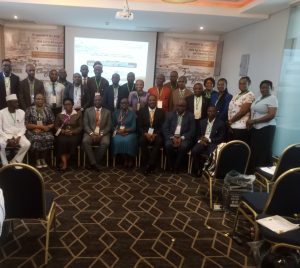
An environmental expert, Dr Dana Omran, says there is a need to strengthen local governments and other institutions, to engender economic growth.
Omran is the Global Director, Strategy and Operations/Regional Director, (Africa) Resilient Cities Network.
She delivered a keynote address, virtually, at the opening of the 3rd Annual Urbanisation and Habitable Cities Conference on Tuesday in Lagos.
The two-day conference, with the theme: ‘Strengthening Resilience in Africa’, was organised by the Centre for Housing and Sustainable Development, University of Lagos.
It was put together in collaboration with the African Research Universities Alliance (ARUA) Centre of Excellence for Urbanisation and Habitable Cities.
According to Omran, strengthening the local governments and other institutions will also improve the well being of citizens, as well as infrastructure.
She said that the local governments, generally, are the closest to the grassroots.
and therefore, need to be given the needed support that will impact directly and positively to residents.
Such, she noted, would create the much needed platforms to stimulate economic growth as well as improved standard of living.
The keynote speaker said that giving the local governments the free hand to take full responsibility for the running of activities by themselves would also make for proactiveness.
This, she said, would especially be so in the face of any natural disaster, like flooding, pandemic and others.
She said that compounding crisis in healthcare, economy and society had also exposed fragilities in the capacity of cities, governments, their businesses and their communities to survive and thrive.
According to her, cities have the opportunity to equally prioritize investment initiatives and projects that meet the interconnected needs of multiple urban systems and thereby yield multiple benefits.
“Resilience building requires a big tent and an all hands on deck approach.
“Universities and research institutions play a critical role in supporting cities to collect and analyse urban data, support technical project development and apply frameworks and tools to promote more sustainable and resilient long term planning,” Omran stated.
Also speaking, Prof. Timothy Nubi, Director, ARUA Centre of Excellence for Urbanisation and Habitable Cities, Centre for Housing and Sustainable Development, UNILAG, described the conference as timely and apt.
He noted that the aim of the conference was to be the hub for world-class, interdisciplinary and multidisciplinary, applied research on urbanization and habitable cities, connecting researchers to initiate, develop, disseminate and affect change in Africa’s cities.
The director said that it was also to develop a collaborative, interdisciplinary network of African researchers, highly capable of producing knowledge and interventions to address intractable issues in Africa’s urban areas.
According to him, it is also to advance impactful education and capacity-building for postgraduate researchers.
This is to be done through targeted mentorships by way of doctoral and post-doctoral fellowships and research interactions, with leading researchers in Africa and elsewhere, among others.
Nubi, who is the host, stated that the conference was the third in a series of conferences of the network, with particular reference to building resilience in Africa.
According to him, the theme of the conference is of great importance, if Nigeria and indeed Africa, are to adapt and cope with the issues around stability and post- Coronavirus (COVID-19 ) economic and social development.
“ Our previous conferences have been focused on transportation in Africa and the informality and inequality in Urban Africa.
“Our focus is to proffer solutions to these endemic challenges across our partner Universities.
“ Our partners have worked seriously in the last three years to establish and maintain contact with the public sector and private organisations and civil societies.
“This has resulted in public lectures at the University of Cape Town, titled Inclusive change in Affordable Housing and Development in African Cities, and another pathway for Healthy and Resilient Slums in Lusaka after COVID-19:
“We also had another, which is Rethinking the Rationalities and Geographies of Urban Services in the era of Pandemics, which was hosted by the University of Zambia,” he said.
He added that the centre also had masterclasses hosted by the Obafemi Awolowo University, Ile-Ife on research methods, and the Federal University of Technology Minna on Technological Advancement in grant-winning proposals.
According to him, given the impacts the network has made, the U.K Research and Innovation has extended its activities till May 2023.
He said it was looking to use the opportunity to focus on supporting PhD students and early career researchers across Africa.
Listing notable achievements of the network, Mubi stated that it had presented a platform for transdisciplinary works that stretch beyond academics.
According to him, this is also part of the process of long-term policy plans and impacts directly on the environment.
He said that it had also consolidated network partners to step out and think outside the box, learning creative ways of solving emerging problems and knowledge transformation.
The centre director noted that several clusters think differently and now interface with different stakeholders.
He said that the network had helped Africans to look at climate change for example, from an African perspective.
According him, the implication is that it enables African researchers to proffer solutions to problems from their lived reality.
In his welcome address, the Vice Chancellor, University of Lagos, Prof. Oluwatoyin Ogundipe, said the university was delighted to host the gathering of erudite scholars and researchers from across Africa.
Ogundipe was represented by Prof. Bola Oboh, Deputy Vice Chancellor (Academic and Research).
He noted that such gathering would avail participants the opportunity to interact, deliberate, engage, collaborate and infer sustainable pathway toward actualising an African agenda.
According to the vice chancellor, the strength of any system, society, organisation or nation is best evaluated by its ability to withstand shocks and stresses, and get back on track.
“The central theme, RESILIENCE, is coming at a no better time than now in our national life and academic history, when resilience in all its ramification is required, to identify innate/inherent strengths and capabilities, engender preparedness, survival instincts and coping strategies” he said.
According to him, at the university of Lagos, resilience is embedded in the administrative structure, as well as in its rigorous and carefully crafted programmes, toward providing critical workforce to fill a manpower gap in the nation’s labour space.
“The 25-year strategic plan of the university of Lagos deliberately seeks to promote self-reliance, Entrepreneurship and Exemplary Leadership skills and capacity in our students”, thereby building human capacity beyond academic qualifications.
“As the vice chancellor of university of Lagos, the university of first choice and the nation’s pride, the culture and tradition of excellence in research has continued to anchor our engagements, collaboration, consultation and deliberations.
“The P3P agenda in UNILAG, under my humble self, Prof. Oluwatoyin Ogundipe led management, is built upon the principle of Public-Private Partnership model to attract supports for academics, research and infrastructural needs of the University.
“The P3P strategy which stands for “Pick a Project, Pick a Programme, Pick a Person” has encouraged well-meaning individuals to support the university’s quest for continued growth and global competitiveness, “ Ogundipe stated.
He added that the development had enabled the institution weather the great storms of the COVID-19 pandemic and still come out stronger than ever
Ogundipe said that as a bastion of research in the university, Nigeria and Africa at large, the African Research Network for Urbanisation and Habitable Cities (AR-NUHC) under the ARUA Centre of Excellence for Urbanisation and Habitable Cities, UNILAG had consistently been a trailblazer.
He added that it had provided unique platforms to engage, collaborate, research, curate and co-produce local knowledge and workable solutions to Africa’s challenges.
He noted that Urban Resilience in Africa was in line with the objectives of the ARUA CoE to address seemingly intractable problems impeding the functionality of African Cities.
“As predicted by the United Nations, within the three and half decades between 2015 and 2050, about three quarters of a billion people will be added to urban Africa.
“Simply put, 750 million people within 35 years will find their way to African urban centres. This portends serious burden on already stretched basic infrastructure, housing and other social services, resulting in relatively high percentage of African urban dwellers living in slum conditions.
“Without any intervention to these prevalent scenarios, more than 50 per cent of Africa’s population are likely to live in slums by 2025, which is just less than three years away,” Ogundipe said.
He however noted that on the brighter side of the coin, where the African strength lies, required confronting the challenges headlong to optimally maximise the vast opportunities that would propel and consolidate Africa’s growth and development.
“Indeed, Africans are resilient. Africa is resilient but the ubiquity of its resilience need be documented, curated and theorized to change the narrative and tell Africa’s story from African’s point of view,” he stated.
Newsmen report that the centre is the hub of the African Research Network for Urbanisation and Habitable Cities, a network of 10 African universities with support from researchers in UK universities.
Some of the 10 African universities are the University of Cape Town, South Africa, the University of Zambia, the University of Nairobi, and Uganda Matyrs University.
Others are, the Federal University of Technology Minna, Obafemi Awolowo University, Ile Ife, American International University of West Africa, The Gambia, University of Ghana, and the Sierra Leone Urban Research Centre at the Ngala University, Sierra Leone.
Most of the universities were participants at the conference. (NAN)
NEWS
Ajuri, Tinubu’s Spokesperson Takes Exit, Cites Mesical Reaaona
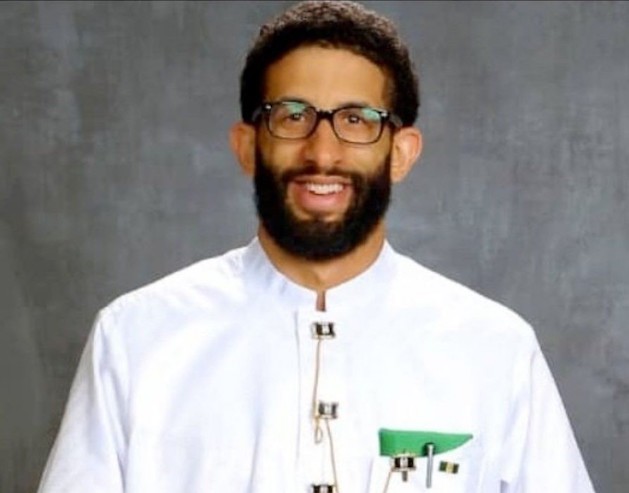
Special Adviser on Media and Publicity to the President Chief Ajuri Ngelale has quit his job. He said in a statement in a Abuja that he would proceed on an ” indefinite leave, to deal with ” medical matters” affecting him amd hia immediate family.Hos statement reads: “On Friday, I submittd a memo to the Chief of Staff to the President informing my office that I am proceeding on an indefinite leave of absence to frontally deal with medical matters presently affecting my immediate, nuclear family.
While I fully appreciate that the ship of state waits for no man, this agonizing decision — entailing a pause of my functions as the Special Adviser to the President on Media & Publicity and Official Spokesperson of the President; Special Presidential Envoy on Climate Action, and Chairman, Presidential Steering Committee on Project Evergreen — was taken after significant consultations with my family over the past several days as a vexatious medical situation has worsened at home.I look forward to returning to full-time national service when time, healing, and fate permit.I respectfully ask for some privacy for my family and family”NEWS
Fuel Crisis: 1000 CSOs Fault Tinubu’s Economic Team, Want Immediate Reconstitution

By David Torough, Abuja
About 1000 Civil Society Organizations (CSOs), under the auspices of Coalition Of Civil Society Organisations (CCSOs), on Saturday Faults President Bola Tinubu’s Economic Team and called for immediate reconstitution.Expressing deep concerns over the state of the economy and escalating fuel prices compounding the hardship of Nigerians despite the recent protest, the groups said Tinubu must act now to avert disintegration.
The groups said the current situation across the country has cast doubt on the competence of the Tinubu economic team and called for urgent review. The CCSOs in a statement by its National Coordinator, Mallam Ibrahim Mohammed, pointed out that the plight of Nigerians is sinking low and their patience is wearing off following the deteriorating economy.The statement reads in part, “The Coalition of Civil Society Organisations (CSOs) is deeply concerned about the deteriorating state of the Nigerian economy, which is becoming increasingly unbearable for millions of citizens.“It is evident that the recent hike in fuel prices and the unstable exchange rate are the direct results of economic mismanagement by those responsible for overseeing our nation’s financial policies. The ripple effects of these failures are being felt in every household across the country, worsening poverty and crippling economic activity.“The floating of the Naira, which was initially sold to Nigerians as a means of stabilizing our currency, has done little to prevent the continued devaluation of the Naira. In fact, the exchange rate disparity has widened significantly, with the Naira losing value daily, impacting the cost of living, basic commodities, and inflation.“While this policy was expected to ease foreign exchange pressure, it has instead deepened economic challenges due to poor implementation and lack of strategic foresight.”The coalition also expressed concern over what it described as a death trap of indebtedness of the Nigerian National Petroleum Company Limited (NNPCL), which also they claimed had slowed down importation of Premium Motor Spirit, PMS, hence the current shortage of PMS across the country. “Of equal concern is the precarious position of the Nigerian National Petroleum Company Limited (NNPCL), which finds itself in a debt trap, with global suppliers of petroleum products losing confidence in Nigeria’s ability to honour its obligations.“Reports have shown that NNPCL has accrued debts totalling over $6 billion, causing petrol supply shortages. International suppliers are now reluctant to continue providing fuel on credit, exacerbating supply chain issues and pushing up the price of petrol at the pump”, they claimed.The CSOs also asserted that, “We hold the managers of the Nigerian economy responsible for these disturbing developments. Their inability to provide sound policies and long-term solutions has left the nation in this predicament.“It is clear that there is no cohesive strategy to address the rising debt, the growing imbalance in the foreign exchange market, or the country’s heavy reliance on importation for petrol supply. The recent hike in fuel prices reflects the collapse of responsible economic management and accountability.“Nigerians are left to bear the brunt of these failures. Businesses are shutting down, transportation costs have skyrocketed, and citizens are spending an increasingly larger percentage of their income on basic necessities. This state of affairs is unacceptable.”The group therefore placed some demands; Immediate intervention from the government: There needs to be a comprehensive and transparent plan to stabilize the Naira, restore confidence in the petroleum supply chain, and negotiate a restructuring of NNPC’s debts to ensure continuous fuel supply.“Accountability for economic mismanagement: Those responsible for the reckless management of our foreign exchange policies and NNPC’s debts must be held accountable. The government must also disclose its plan to mitigate the rising fuel costs and economic burden on Nigerians.“A return to sound financial policy: The floating of the Naira has proven ineffective under current conditions. We call for a re-evaluation of monetary and fiscal policies to stabilize the economy, reduce inflation, and attract foreign investment.“In conclusion, the Coalition of Civil Society Organisations reiterates that without immediate corrective measures, the economic situation will continue to deteriorate, leading to further hardship for the average Nigerian. The government must act decisively and responsibly to reverse this downward spiral”, they added.NEWS
Tension in Makurdi Community as NAF Personnel Demolishes Houses, Destroys Rice Farm

There is growing tension in Ugondu community, Makurdi LGA, Benue state by young people opposed to the demolition of houses and destruction of rice farms in the area allegedly on the directives of senior Air Force officer, Air Commodore Akinbuwa Ayodele.
It was learnt that Commodore Ayodele, who is facing multiple legal actions following dispute over a plot of land located on George Akume Way Makurdi and owned in blatant disregard to the judicial process embarked on destruction of structures on the plot.
Eyewitness said when the equipment arrived no one imagined it was for destruction.
But in a militray- like operation, two flats of two units each, completely roofed, electrified and plumbing work completed were among the structures demolished as the bulldozers rolled over rice farms in the vicinity as well.
It was learnt that last year, a Makurdi High Court presided by Justice Mary Ijohor, granted an order of perpetual injunction, in the same matter, upon application by the supposed owner of the plot and awarded the sum of One Million Naira (N1,000,000.00) only, as cost. The matter, enforcement of fundamental rights, was marked as MHC/582/M/2023.
Godwin Akor whose rice farm was destroyed in a chat with newsmen said that he was shocked at the development. He however said he won’t speak more on the matter as it is still before the court.








